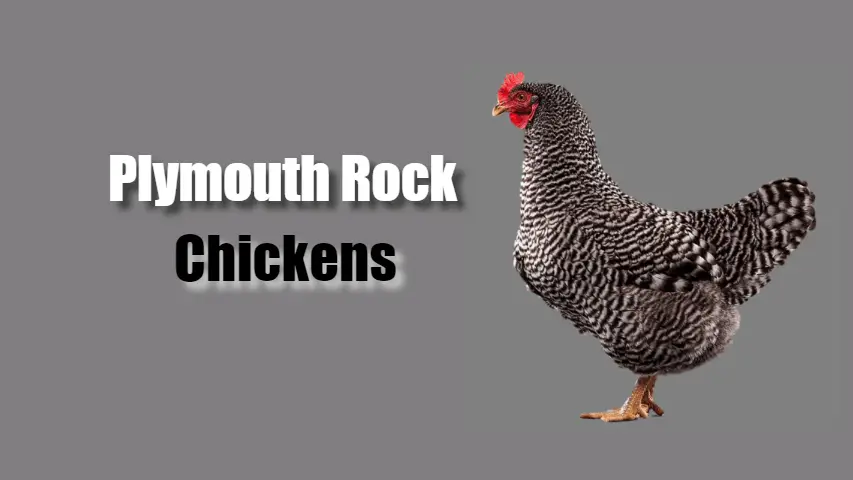Last Updated on April 20, 2022 by Pauline G. Carter
The Plymouth Rock chickens are also known as “Barred Rocks”. The Barred Rocks are actually a variety of the Plymouth Rock breed. Other varieties are White, Partridge, Buff, Silver-Penciled, Black, Blue and Colombian, all developed in the USA in the mid-19th century.
This bird was first shown off as a breed in 1869. It has exceptional qualities, resulting in it being popular all over the world. Somewhere in the 1950s, as factory farming and commercial-chicken farming was starting to become prevalent, the bird became crossed with quite a few other breeds.
That meant that the true Plymouth Rock was harder to find. At the moment, there are many breeders in the USA and across the world who are focusing on trying to pure-breed the Plymouth Rock in their efforts to bring the real, authentic breed back.
Related Article – Wyandotte Chickens, In the Pecking Order, Come Out Tops
Plymouth Rock Chicken | Breed Profile
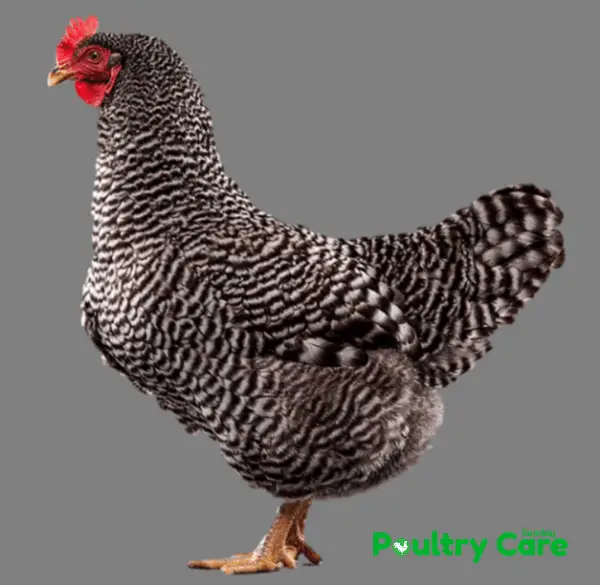
| Country of origin: | United States |
| Primary use: | Dual-purpose meat/eggs |
| Weight: | Male: Standard: minimum 3.4 kg (7.5 lb)Bantam: maximum 1.36 kg (3.0 lb) Female: Standard: minimum 2.95 kg (6.5 lb)Bantam: maximum 1.13 kg (2.5 lb) |
| Temperament: | Calm |
| Recognized Varieties: | Black Frizzle, Blue, Partridge, Barred, Buff, Columbian, Silver Penciled, Black, White |
| Egg production (annual): | 280 |
| Egg color: | Brown, Light Brown |
| Egg size: | Large |
| Comb type: | Single |
Characteristics of The Plymouth Rock
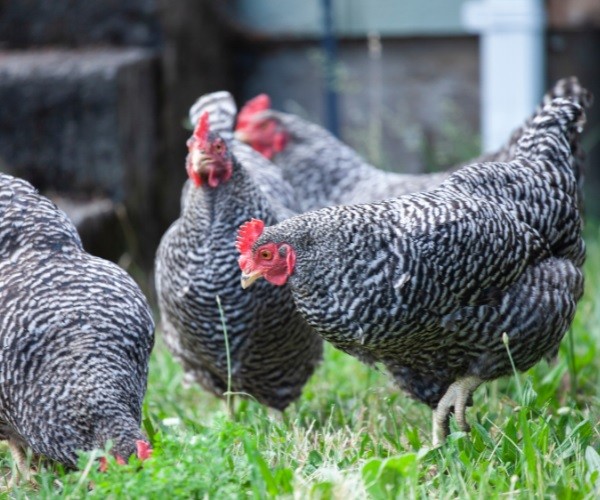
The standard coloring of the Plymouth Rock chicken in the UK, USA and Canada is black and white. The chicks can be light or dark grey. These birds have a single moderately-sized comb. Their skin and legs are a yellow color. They have a red face and red ear lobes with a bright yellow beak. Their eyes are bay-colored.
Plymouth Rock is known for its long and broad back. It is quite a deep, full breast. The hens usually have a deep and full abdomen and this apparently conveys the message that the hen is a good egg layer.
Plymouth Rock chicken is a dual-purpose breed, meaning that it can be used for both egg production and meat production. The breed is known for its docile personality and hardiness. Plymouth Rock chicken typically has a light brown plumage with white markings on the head and tail.
It is best that breeders don’t choose birds that have shallow breasts, narrow bodies and high tails to breed with. They hold their feathers loosely but they are not that long to get tangled.
According to the APA – American Poultry Association, weights for cocks are from 7.5-9.5 lbs. or 3.4-4.3 kg. Hens are from 6.6-7.5 lbs. or 3-3.4 kg. A cockerel will weigh in at 8 lbs. or 3.6 kg and a pullet at 5-6 lbs. or 2.3-2.7 kg. Cockerels are mature male chickens under a year old and hens under a year old are called pullets.
Plymouth Rocks make an excellent farm chicken. They are docile birds, showing a bit of broodiness. They are good mothers. Some of the varieties make good egg layers but others are bred more for their meat.
During molting time, you won’t find the hens laying eggs and you might find decreased egg production in wintertime. But different strains of the bird will depend on the number of eggs. Plymouth Rock eggs are quite large and have a brownish color. Some will even be light whilst others even get a pinkish tinge to them.
The bird can become quite tame; not being particularly aggressive. Some of the cocks and hens get big and active enough to pose a problem if they were to become aggressive.
The Plymouth Rock is a hardy bid, able to endure cold temperatures. That means they make a great choice for those who live in climates where the temperatures are lower. Their magnificent feathers and quite-heavy weight keep them plump and toasty.
But that doesn’t mean they don’t need protection and for that, they will require a well-built coop to cater to their needs, like all chickens. They need a place in the coop where they will get warm sun when it’s nippy and shade when it’s hot.
Related Review – Silver Laced Wyandotte: Are Everything They’re Cracked Up To Be
Behavior/Temperament
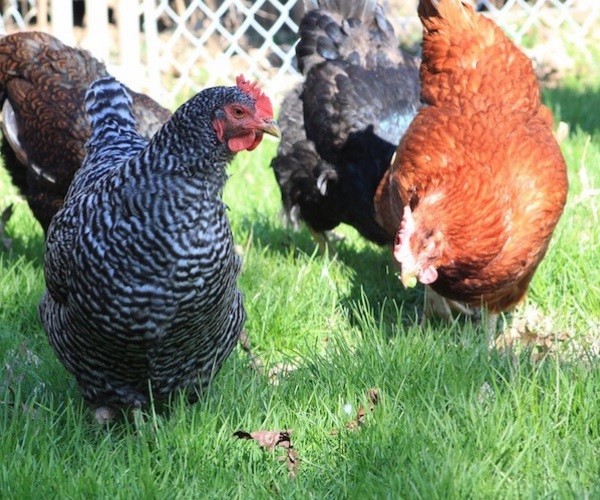
Plymouth Rock roosters as well as the hens are calm creatures. Around the farm, they live happily with people around them, and also other animals. Generally, they are docile and friendly. They don’t seem to mind being confined.
But they are much happier and content if they are allowed to roam around freely, foraging around the farmyard or in a garden. In the right environment, the hens do not often go broody.
What to like (love) and not to like (hardly anything) about the Plymouth Rock Chickens:
We Liked
- It’s beautiful
- Has a friendly nature
- It is hardy and can tolerate the cold
- A good egg layer
- Good for meat production
- Does well in confined spaces
- It’s protective but cautious of predators
- Curious
- Makes a good pet
- The hens don’t often go broody and make good mothers
We Don’t Like
- Sometimes they can be bullies
- Some of them battle a bit in very hot weather
- Can be stubborn at times
Is The Plymouth Rock Chickens Good Choice For You?
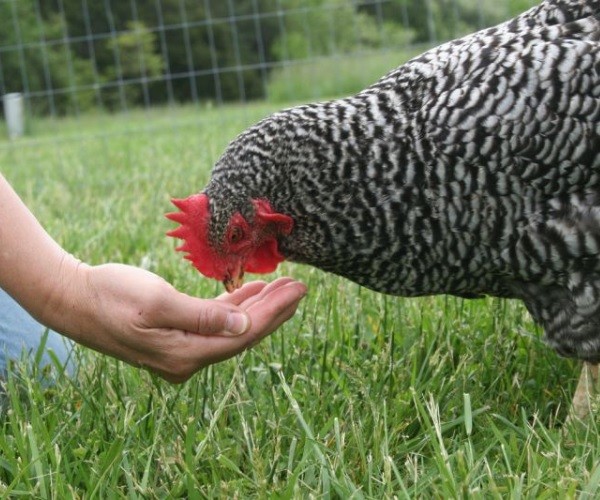
Most farmers raise the Plymouth Rock as a dual-purpose bird. They are sought-after birds because they have both good egg-laying and meat-providing qualities. Generally, Plymouth Rock will live for around 6-8 years, even achieving 10-12 years. Yes, they are a good choice, because:
- They are excellent suppliers of eggs, generally all year round, able to produce around 200 large eggs per year.
- They have lovely temperaments, gentle and docile. They love pottering around the family and therefore they make a good family pet.
- They get along well with other animals.
- They are hardy, and even though they need care in different weather conditions, they don’t easily succumb to being ill.
- They aren’t the best fliers so they don’t need large fences built to confine them.
- They do well in confined areas, a good reason why they make good backyard chickens.
- Even though all chickens need care, the Plymouth Rock comes fairly standard around grooming, its diets and its maintenance – making them a good choice.
- They don’t need high maintenance. You just need to check them on a regular basis for lice, worms and parasites. Always ensure they have a nice patch for dust-bathing which they love.
- No special dietary requirements. Because Plymouth Rock is a nice egg-laying chicken breed, it is advised that you give them their calcium boost. You will need to incorporate some shell grits into their diets. You can also add crushed egg shells to their food.
All chicken breeds need a safe, well-ventilated and secure coop for their home. As they are such good egg layers, spacious and private nest boxes are required so that they can lay their eggs. They need good-sized perches to sleep on and roost.
It’s important that the coop has good ventilation because this keeps these birds nice and cool in the summer months and warm in the winter months.
If you read this article, you will understand that there is every reason you could invest in owning some Plymouth Rock chickens. They amount to a big plus.
Final Thought
Plymouth Rock Chicken is a great breed of chicken for both egg and meat production. They are known to be docile and hardy, making them a great choice for any backyard flock. Plymouth Rock chicken typically has a light brown plumage with white markings on the head and tail. This is an excellent breed for any chicken enthusiast.
Related (Chicken Breeds Information):
About Author (Pauline G. Carter)

Pauline G. Carter is a well-known pet blogger who has written about the world of pets for several years. She is passionate about pets, from cats and dogs to birds, reptiles, and poultry. Her blog, which is updated regularly, is filled with articles and guides on pet care, nutrition, and training. She also shares her experiences and observations on pet ownership, making her blog relatable and informative for pet lovers. She is a true animal advocate and is dedicated to promoting responsible pet ownership. Let’s Go …
